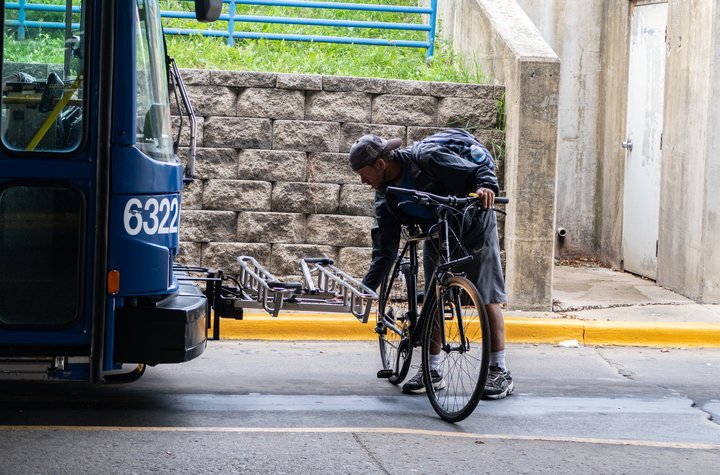As an organization that advocates for walking, biking, and public transit to create healthy, sustainable, and equitable communities, this moment necessitates rethinking and adapting to changing needs. This means not necessarily supporting policies or ideas that we embrace in the non-COVID-19 world.
We believe in the ability for people to travel freely, but we know this moment requires taking a step back and adjusting that lens we normally use for viewing these issues. We want to see policies that enhance safety for essential workers but do not have the potential to worsen the public health crisis. It is at that intersection that we must view our decisions as mobility and transit advocates.
This week, we learned that 70 percent of COVID-19 fatalities in Chicago are Black. It is important for us to think about the implications of this data and consider how our work can contribute to lessening these inequities now and in the long run. Mobility justice cannot exist in a world where racial justice does not exist.
LAKEFRONT TRAIL CLOSURE
Last month, Mayor Lori Lightfoot announced the closure of the Lakefront Trail, the 606, and the Riverwalk, in addition to adjoining parks. This decision was made in response to large crowds of people being at the Lakefront on a warm day, something that’s typically a welcome sight but endangers public health during a pandemic.
We discussed some of our initial thoughts in a blogpost after the decision was made, emphasizing that public health and essential travel had to be the priority in this moment. With no clear way for public officials to keep people from congregating at those trails and limited resources for staffing trails to allow for essential travel, we understood the Mayor’s difficult decision.
We support using alternative bike routes to the closed trails. We know feeling safe on a bike is not a reality for all Chicagoans and we know that these issues will not be solved during a pandemic. It is not easy to support the closure of trails, but with the severe implications of this moment, we feel it is more important to focus our energies on other issues of essential travel.
TRANSIT RIDER AND WORKER PROTECTIONS
Last week, we called for greater protections for transit operators on public transit in Chicago. Six CTA bus drivers and train operators have tested positive for COVID-19, in addition to a Pace driver. The people staffing our transit are essential and they deserve to feel safe and protected.
Essential workers need to feel safe and protected while using transit, too. We recently launched our transit rider survey to learn about the experiences of Chicagoans still taking transit. It is critical to uplift the stories of people not able to work from home and advocate for ways to keep them safe while on public transit.
Active Trans contributed to a successful national effort for the federal COVID-19 stimulus bill to include emergency operating assistance for public transit. We activated hundreds of supporters in the Chicago area, who generated nearly 1,000 connections with members of Congress. Soon CTA, Metra, and Pace will receive approximately $1.5 billion in federal assistance.
OPEN STREETS
Putting our resources towards supporting the movement of the most marginalized is of the utmost importance right now. It is through this lens that we have been evaluating the call for open streets, which we support in a regular context.
Our biggest event of the year, Fifth Third Bike the Drive, uplifts the potential of car-free streets for people. For years, we put on our own Open Streets events in Chicago and fought for the city to fund the initiative long-term.
We believe in a world where people can enjoy more room without cars. However, the context of a pandemic does not seem like the most appropriate moment to be pushing forward this vision.
Planning, implementing, and managing an Open Streets initiative requires significant city resources during a time when the strain on our local government is immense. In conversations with community partners serving Latinx, Black, and Asian communities, nobody pointed to open streets as an immediate need.
With little ability to engage communities right now, it raises deep equity concerns in terms of who we are serving by calling for a massive closure of streets for walking and biking. In New York, the Mayor allocated massive amounts of police resources to staff the closed streets. Closing streets in Chicago would most certainly mean police presence at each of these streets, which we know has negative connotations for Black and Brown communities who have historically been overpoliced.
With the need to stay home as much as possible, advocating for open streets does not align with that immediate need. We are continuing to look at other possibilities for more space for people to engage in essential travel, such as widening sidewalks.
In the world we believe in, people can freely walk, bike, or take public transit. But the needs of this moment mean we must do that a lot less, if at all.
Embracing that reality is not an easy choice for an organization built on active transportation, but one based on our commitment to making sure we play our part to keep more Chicagoans safe so they can one day have the freedom to walk, bike, and use transit again.

